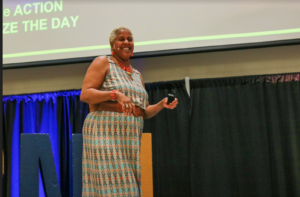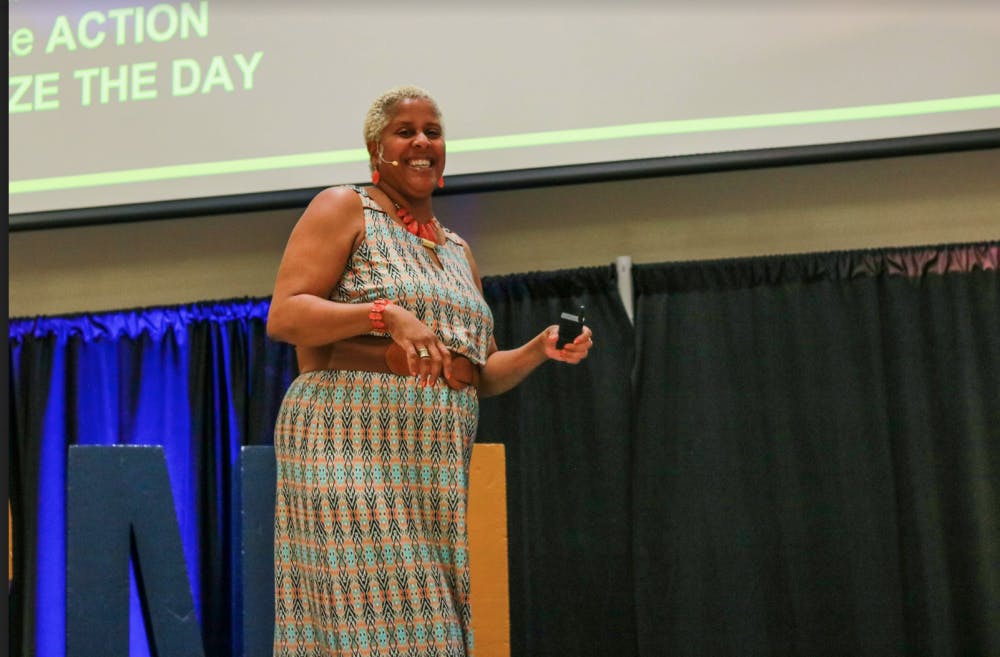By Megan Kelly
Staff Writer
The Office of Leadership held the first ever lecture in the TCNJ Talks Series, titled “Making the Impossible Possible” at 6 p.m. on May 1 in the Brower Student Center Room 100.

The speakers consisted of junior psychology major Ralph Betancourt, College chemistry professor Benny Chan, senior nursing major Theresa Fineza and Assistant Director of Career Services Lynette N. Harris.
Through the diversity of topics including mental health, STEM education, health and self-discovery, the four speakers fused their expertise in the first installment of the TCNJ Talks series.
Betancourt focused on his own experiences at the College as a leader on campus and as a gay man. He stressed the importance of having conversations with the people around oneself and being inclusive, as well as making sure that people keep an eye on their mental health.
In order to change the way mental health is perceived on campus, Betancourt has gotten involved with Student Government, Greek life and PRISM. He has even reached out to College President Kathryn Foster to spark conversations about mental health awareness.
“I said, ‘you know, I really want to create initiative to change how mental health is perceived on this campus,’ and she really resonated with that,” Betancourt said in regards to his conversation with Foster.
He hopes there will be new initiatives coming in the fall semester to address the stigma surrounding mental health.
“It’s good to acknowledge yourself, that you might not be doing OK, and that’s OK.” he said. “We’re not meant to be perfect. We’re human beings. We have flaws ... It’s OK to fumble and fall sometimes.”
Chan, who spoke second, pulled from his own life experiences as well. At the College, he is committed to researching and redesigning the STEM curriculum to be more inclusive to minority students. Chan said that he and other professors in the department have done “thousands of hours of interviews of TCNJ students on why they succeed and why they’re failing their STEM classes.”
Chan believes that social identity can be a key factor in the success of students in the STEM department.
The professors’ resulting solution is a model called the Intersectional Curricula Design, which will combine social identities — and their relationships with each other — with a STEM curriculum. Chan gave several examples of aspects relating to social identity that might be holding students back in the classroom, such as fasting during Ramadan, or if the College has a completely new learning environment that some students did not experience in high school.
“Once we start playing with identities, we have to go into the concepts of intersectionality, so how do these social identities come together,” Chan said. “It allows us to bring these concepts of privilege and social oppression, systematic oppression, into our conversations of why people are doing well and why people are not doing well in our science careers.”
DiAnna Sela, a senior English and women’s, gender, and sexuality studies double major, attended the talk because she felt the topics addressed are topics the College should be made aware of.
“I believe this is really important because our school represents so many ethnic and socioeconomic backgrounds and we need to account for that when we are educating our students because of the fact that not everybody may have had the same access to education and resources that other people have had access to,” she said. “So when we think about equitable solution to helping all students, the first step is representing them properly.”
Next up to speak was Fineza, who spoke about the HIV/AIDS epidemic of the 1980s. She opened with the story told from the second person that described what it would be like to be an HIV+ person living in New York City. She also spoke of groups such as the AIDS Coalition to Unleash Power and the Gay Men’s Health Crisis.
To Fineza, the story of people coming together and working to achieve something seemingly impossible — finding a treatment or cure for HIV/AIDS — personified the theme of the talk perfectly.
“I ask humbly that each and every one of you, once a day, try and seek out the humanity in someone that’s different from you,” Fineza said. “If we make that collective effort, who knows what kind of impossible future we can make possible for those who come after us?”
Lastly, Harris spoke about her experiences of seizing the day, first as a baby girl born three months prematurely in Camden, New Jersey, second as a student at Montclair State University — formerly Montclair State College — and third in her career at the College.
Harris told the story of her childhood and how she went to college and created the life for herself that she wanted instead of playing the victim and holding onto negative energy. Her message focused more on changing oneself from within, prioritizing self-care and making each day into a lesson.
Harris concluded the talk-show with a piece of advice for students finding themselves in their college careers.
“Life is a masterpiece,” Harris said. “And as we’re becoming the masters of our own destiny, life is a masterpiece when you learn to master peace.”







